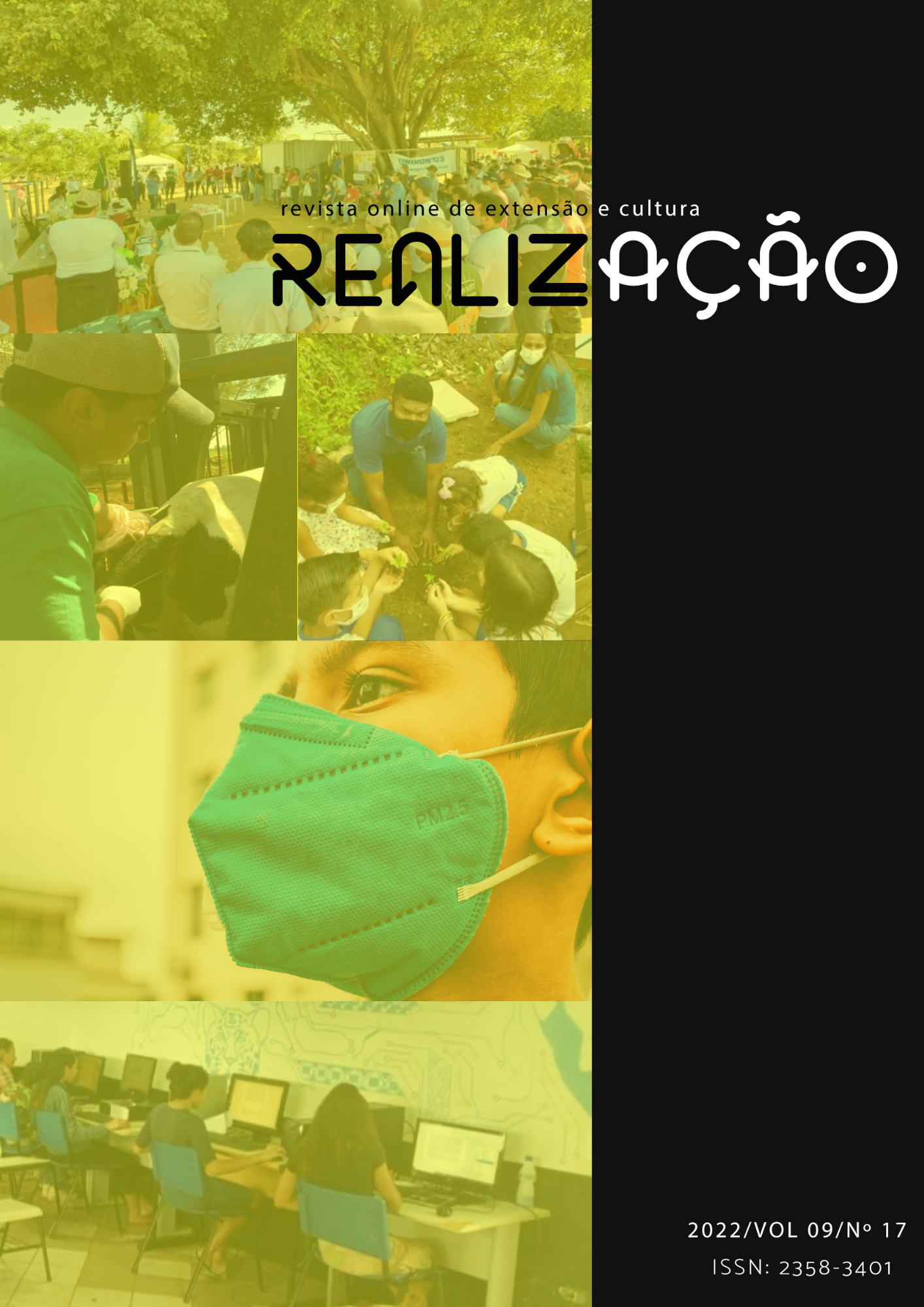Monitoring fish cultivation water in the Itamarati settlement – MS during the winter
DOI:
https://doi.org/10.30612/realizacao.v9i17.15940Keywords:
Aquaculture, Fish Farming, Family farming, Sustainability, Water qualityAbstract
The objective of this work was to monitor the water quality during the winter of 2021 in fish farms with excavated tank, canvas tank and aquaponics system in the Itamarati Settlement. Through portable equipment for monitoring pH, temperature, dissolved oxygen and saturation, and rapid colorimetric test kits for checking hardness, toxic ammonia and nitrite, it was possible to observe the quality of water from different fish farming systems. Each system responded to monitoring differently over the period. The temperature showed a wide range ranging from 22.4 ºC to 12.9 ºC. The pH remained within neutral with small variations, reaching 6 and reaching 9, for all analyzed systems. Dissolved oxygen and saturation were presented at low concentrations, lower than the recommended 2 mg.L-1, however, the fish did not present “boozing”. For the ammonia and nitrite variables, these show acceptable values so as not to cause any adverse effect on fish. In relation to water hardness, the systems presented soft water. During the monitoring, all producers were instructed and trained to carry out water quality analysis procedures as well as practices to minimize the impact of low oxygenation and low temperatures. It is concluded that the monitoring of water quality is extremely necessary to contribute to the optimization of fish production, combined with the knowledge and knowledge of producers.
Downloads
References
AMARAL, M. A. DO et al. Qualidade de água como alicerce para a produção sustentável de peixes à pequenos produtores. Realização, v. 7, n. 13, p. 131–144, jun. 2020.
CONAMA. 357. RESOLUÇÃO CONAMA N° 357, DE 17 DE MARÇO DE 2005.2005.
https://www.icmbio.gov.br/legislacao/ res_conama_357_2005. Acesso em: 24 ago. 2021.
IBGE. IBGE. Censo-agropecuário. 2017. Disponível em: https://www.ibge.gov.br/estatisticas/economicas/agricultura-e-pecuaria. Acesso em: 24 ago. 2021.
INMET. INMET: Tempo. Disponível em: <https://tempo.inmet.gov.br>. Acesso em: 24 ago. 2021.
MACEDO, C. F.; SIPAÚBA-TAVARES, L. H. Eutrofização e qualidade da água na piscicultura: consequências e recomendações. Boletim do Instituto de Pesca, v. 36, n. 2, p. 149–163, 8 nov. 2018.
MAUAD, J.R.C.; MUSSURY, R.M. Centro de Desenvolvimento Rural do Itamarati: relatos e vivências. – 1 ed. Dourados – MS: Seriema, 2021.
SILVA, D. A.; BEZERRA, J. S. O turismo rural como vetor de desenvolvimento local para o Assentamento Itamarati em Ponta Porã – MS. Revista Eletrônica da Associação dos Geógrafos Brasileiros Seção Três Lagoas, p. 27–58, 2018.
SILVA, W. L. M. et al. sustentabilidade na aquicultura: dimensões social, econômica e ambiental – uma revisão de literatura. Educamazônia - Educação, Sociedade e Meio Ambiente, v. 20, n. 1, Jan- Jun, p. 87–108, 29 jun. 2018.
SISTE, C. E.; GIRÃO, E. G.; DUNCAN, B. L. Manual para Formação e Capacitação de Grupos Comunitários em Metodologias Participativas de Monitoramento da Qualidade da Água. Embrapa Agroindústria Tropical, 2011.
URCHEI, M. A. et al. Caracterização Edafoclimática do Assentamento Itamarati, MS, e Análise Socioeconômica Regional. Embrapa Agropecuária Oeste, 2002.
Downloads
Published
How to Cite
Issue
Section
License
Copyright (c) 2022 Daniele Menezes Albuquerque, Laiane Alves da Silva Palacio, Felipe Santos Torres, Marcia Regina Russo, Janaína Graça de Oliveira Carvalho, Juliana Rosa Carrijo Mauad

This work is licensed under a Creative Commons Attribution-NonCommercial-ShareAlike 4.0 International License.
Autores que publicam nesta revista aceitam as normas de publicação, bem como, concordam com os seguintes termos:
(a) O Conselho Editorial se reserva ao direito de efetuar, nos originais, alterações da Língua portuguesa para se manter o padrão culto da língua, respeitando, porém, o estilo dos autores.
(b) Autores mantêm os direitos autorais e concedem à revista o direito de primeira publicação, com o trabalho simultaneamente licenciado sob a Creative Commons Atribuição-NãoComercial-CompartilhaIgual 4.0 Internacional que permite: Compartilhar — copiar e redistribuir o material em qualquer suporte ou formato e Adaptar — remixar, transformar, e criar a partir do material. A Creative Commons Atribuição-NãoComercial-CompartilhaIgual 4.0 Internacional considera os termos seguintes:
- Atribuição — Você deve dar o crédito apropriado, prover um link para a licença e indicar se mudanças foram feitas. Você deve fazê-lo em qualquer circunstância razoável, mas de nenhuma maneira que sugira que o licenciante apoia você ou o seu uso.
- NãoComercial — Você não pode usar o material para fins comerciais.
- CompartilhaIgual — Se você remixar, transformar, ou criar a partir do material, tem de distribuir as suas contribuições sob a mesma licença que o original.
- Sem restrições adicionais — Você não pode aplicar termos jurídicos ou medidas de caráter tecnológico que restrinjam legalmente outros de fazerem algo que a licença permita.


